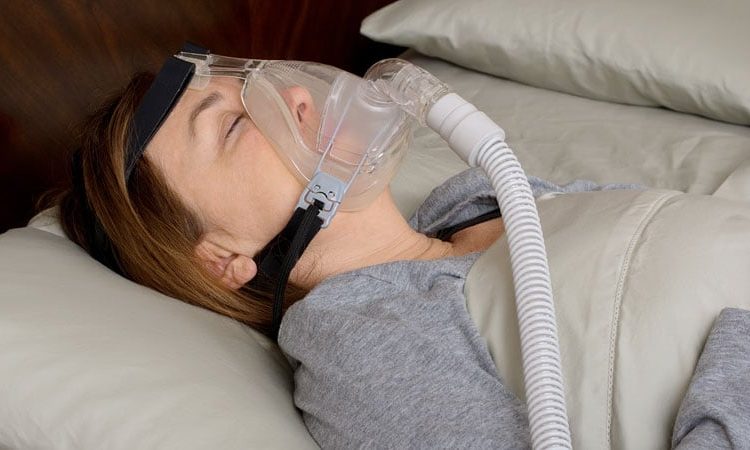The prognosis for patients with subsequent major adverse cardiovascular and cerebrovascular events (MACCE) was associated with obstructive sleep apnea (OSA) and stratified weight parameters, based on data from a prospective, multiyear study of 1920 patients previously hospitalized for acute coronary syndrome (ACS).
Obesity is a major risk factor for OSA, and each condition can exacerbate the other. Both obesity and OSA have been reported to have a strong association with coronary artery disease. OSA alone is associated with adverse cardiovascular events after ACS, Wen Hao, MD, of the Center for Coronary Artery Disease, Division of Cardiology, Beijing Anzhen Hospital, Capital Medical University, in China, and colleagues write. However, the prognostic significance of the OSA interaction with defined weight parameters on long-term cardiovascular events for ACS patients was not previously assessed, they say.
In a study published in the journal Chest, the researchers reported on a subanalysis of their OSA-ACS clinical trial (NCT03362385), which involved 1920 patients (84.5% men; median age, of 56.4 years) with ACS.
The primary endpoint was MACCE, defined as a composite of cardiovascular death, hospitalization for ACS (myocardial infarction or unstable angina) or heart failure, stroke, or ischemia-driven revascularization. Secondary endpoints were the components of MACCE. All MACCE data met Standardized Data Collection for Cardiovascular Trials definitions and were collected via clinical visit, medical record review, and telephone calls at 1, 3, and 6 months following initial hospital discharge, with additional 6-month intervals thereafter.
Weight and OSA factors were stratified to assess their effects on MACCE. For weight, patients were grouped as either obese or nonobese, as determined by waist and neck circumference measurements and a BMI value adjusted for Asians of ≥28 to define an obese status. Obesity was assigned to 718 (37.4%) patients in the cohort. Obese and nonobese groups were further subdivided on the basis of OSA categorization. After clinical stabilization of ACS, type III portable cardiorespiratory polygraphy measurements from an overnight sleep study were used to establish Apnea Hypopnea Index (AHI) values. Patients with AHI values ≥15 events/hour and <15 events/hour were placed in the OSA and non-OSA categories, respectively. Additional recorded breathing relevant factors included nasal airflow, thoracoabdominal movements, snoring episodes, nocturnal arterial oxygen saturation, and hypoxemic burden. A total of 1013 (52.8%) patients were identified as having OSA. Investigators were blinded to OSA information during follow-up MACCE data collection.
MACCE was experienced by 388 (20.2%) patients during the median follow-up time of 2.9 years. Evaluating the effect of the obesity factor alone, MACCE incidences were significantly higher in patients with obesity compared to patients without obesity (HR, 1.29; 95% CI, 1.06 – 1.58; P = .013). Secondary endpoints were primarily hospitalization for ACS and ischemia-driven revascularization. Univariable Cox regression analysis comparisons revealed that MACCE risk in the overall population was significantly higher in OSA than non-OSA patients (HR, 1.35; 95% CI, 1.10–1.65; P = .004). However, sensitivity analysis showed this significant increased risk to be associated with only moderate/severe OSA.
Stratification for obesity and OSA was used to assess effects on subsequent MACCE risk of ACS patients. The frequency of OSA was lower in patients without obesity (43.9% vs 67.5%; P < .001). After adjusting for anthropometric and clinical confounders, OSA independently predicted MACCE incidence in patients without obesity (HR 1.34; 95% CI, 1.03 – 1.75; P = .03) but not for patients with obese (HR, 1.10; 95% CI, 0.78 – 1.55; P = .58). The interaction between obesity and OSA was not significant (P for interaction, 0.35). The authors caution that lack of interaction signal may be due the small size of the study and overall low frequency of cardiovascular events within its population. They say further validation with larger cohorts is needed.
Among other limitations the researchers noted to address in future studies were additional lifestyle data relevant to cardiovascular health, ethnic variation, measuring additional features specifically related to fat, and sleep apnea–specific burden. This study presents new prognosis information regarding OSA and obesity effects on subsequent MACCE risk for ACS patients, according to the authors. The finding of this study that OSA was independently associated with increased cardiovascular events for patients with ACS and particularly those without obesity “highlights the importance of identifying OSA” to provide improved long-term treatment plans for these patients.
The study was sponsored by a number of research foundations in China. The authors have disclosed no relevant financial relationships.
Chest. Published February 8, 2023. Full text
For more news, follow Medscape on Facebook, Twitter, Instagram, and YouTube.
Source: Read Full Article
